Crashing down to earth was the best thing that ever happened to me...
<a href=www.vheadline.com>Venezuela's Electronic News
Posted: Monday, June 23, 2003
By: Thais J. Gangoo
Leaves flying away from a tree that has just grown half
It isn't Fall yet, so what is going on?
Maybe it wants just to change its color and lose some memories
Memories of birds, fruits, and flowers on its arms.
Finally its color has changed,
It's now as yellow and bright as the sun,
It shines like the moon in the darkest night,
Though one thing is missing now,
Someone wrapped up in its arms.
VHeadline.com LifeStyle correspondent Thais J. Gangoo writes: Have you ever felt this way? I'm pretty sure many of us have felt this way at least once in our lives ... no matter how many friends we have, or how close our family remains, or even how sweet our pets can be ... when there is no love, no passion, our lives feel as empty as a bar at 10 o'clock in the morning.
For the last few weeks I've been able to see so many different things I had seen before, but never paid attention to them. One of them was the fact that, when there is so much work to do, our only one friend when we get home (if we live alone) is our computer. Sometimes its either too late to call a friend or we're too tired to even go out for a cup of coffee. So, we sit in front of the computer and become part of a whole different world, where we can spend hours and hours without noticing that we've a real life to live.
I must be honest, I have been immerged in this world for many months, and I've even gone beyond my own reality. Crashing down to earth when I needed it, was the best thing that ever happened to me, though it really hurt.
It all begins when we get those emails telling us about websites where you can make friends and meet nice people ... Would it hurt to give it a try? ... I may have some fun! Those are the things we first say to ourselves right after we read those emails ... then, we register for free and, without knowing it, we become part of online relationships statistics.
It's amazing how many people go to those websites to find their significant other ... thousands and thousands of people really believe they can make the best friends online and even find their future husband or wife ... and I mustn't forget to include myself.
Though I've never paid, since I always register for free, I must say that those webpages really help us to get away from reality! We all need that once in a while ... don't you think?
Have you ever had an online relationship? Do you truly believe in them? Is it easier than meeting someone in a bar, a park or even the subway?
I'm not sure if it is easier or not ... but I am sure those relationships have changed people's lives in many ways. I've even heard about divorces caused through online affairs, but I have also heard about successful marriages and happy families after an online encounter.
Not only marriages, but also great and long lasting friendships can be found online. My own experience can tell you that it can be possible! When I first started using the Internet I met a guy from Mexico who is still my online friend after 6 years. We don't talk each day or anything like that ... but we keep in touch, even though we've never met in person.
Also, I've met great people who are still my friends and have helped me a lot when I've been going through a hard time. Some of them have even made me believe that dreams can come true. I've met people I always dreamed about when I was a little girl, and now they're my best friends in my real life. And, when I say real life, I'm talking about sharing good times with them ... not only online, but also in person.
I've also found a love that has never become part of my real life ... but it has long been deep in my heart and has been a wonderful experience.
Anything can happen after we let ourselves become part of this electronic world ... if you believe in love, anything is possible ... and if you don't, let's give it a chance to grow inside our hearts. It doesn't really matter where you find it!
Love is the power that makes us do the things we like. Love is the key to open doors that hate has made us lock up ... love is the water that extinguishes the flames that make our hearts crash and burn!
No doubt about it! All we need is love.
An unequal gift exchange
Inside Joong Ang Daily-Bilingual News
The isolated Yanomami, living in the Amazon basin near the Venezuela border, are the last tribe on earth that preserves their indigenous culture. This belligerent tribe maintains its ties with other tribes through trade.
The Yanomami's tradition of barter is unique. After providing a good, they demand reciprocity in goods, but they do not want immediate return. They accept whatever is the recompense at a later time. During the wait, they visit several other tribes to exchange goods.
For someone not familiar with the Yanomami culture, the goods received from them can be easily mistaken as gifts. But, there is no such thing as a gift among the Yanomami. Almost always they demand in return more than what they gave, according to °?Yanomamo: The Last Days of Eden,°± written by Napoleon Chagnon.
In studying the culture of the Yanomami, one concludes that giving gifts is contrary to human instinct. As civilization developed, the culture of gift-giving probably took root as those above others in a hierarchy demanded tribute.
Wise men taught us not to expect a gift in return for what we give. Aristotle said the best of us believe that giving a gift is more blessed than receiving one. The Bhagavad Gita, the Hindu scriptures, state that a pure gift comes from the heart, with no expectations of anything in return.
Today, we need gifts more than ever. The most beautiful stories are those of hard-earned wealth donated to scholarship funds. These acts of philanthropy stand out for selfless goodwill as a growing number of schools close on Teachers Day to clear up the misunderstanding that part of the observance is presenting gifts to teachers. Such a practice erodes the true meaning of gifts.
Recently, credit card companies began selling gift cards, a sort of debit card. Samsung Card Co. sold 60 billion won ($50 million) worth of gift cards last year, and more card companies are entering the business. The cards come in 50,000 won to 500,000 won denominations; only the name of the purchaser of the card is recorded.
Because the gift cards can be used at any store that accepts credit cards, they are virtually cash. Card companies advertise that the gift cards can be used as allowances for children and gifts for friends. If the companies persist in calling them gifts, the cards are probably best referred to as presents the Yanomami would relish.
The writer is a deputy business news editor of the JoongAng Ilbo.
A half-century of compassion for those stricken by cancer
<a href=www.sunspot.net>SunSpot.net
Originally published Jun 8, 2003
Michael Olesker
AT THE end of another miserable rainy day, at the end of a half-century's work in cancer and psychiatry, there stood a beaming Dr. Nathan Schnaper last week, with his familiar red bow tie that could be seen halfway across downtown, in the midst of his very own legend.
He stood there at the University of Maryland Medical Center with his colleagues and his family all cheering him, and Schnaper tried to wave them off and tell them they were making too much of him. But they weren't. They named a new internship program in his honor, for students interested in medical research. And they said they were naming a new healing garden for him. And then a few folks stood up to try to put words around their emotions.
But how do you sum up so much time, and so much care, in a couple of minutes? This is a man, now halfway through his 80s, who "officially" retired seven years ago but still sees patients several times a week at the hospital's Greenebaum Cancer Center - as a volunteer.
"The most wonderful man in the world," said Sue Singer, whose late husband, Richard, was a cancer patient of Schnaper's. "Can you imagine? He sees these patients but doesn't charge them. And patients who are too weak to come in, he visits them at home. Who does such things today?"
"An incredibly caring person with great insight, who has seen so many families through the worst catastrophes," said Dr. Morton I. Rapoport, who will be retiring in September as the University of Maryland Medical System's chief executive officer. "Most of us have enemies. I don't know anybody that doesn't like Nate."
"He's been a mentor to practically everybody in this room, whether it's oncology or psychiatry - probably notary public, too," added Dick Adams, chairman of the hospital's cancer center.
"A great teacher," said Dr. Skip Connor. Schnaper is professor emeritus of psychiatry at the University of Maryland School of Medicine. "He taught me as a resident," Connor said. "What made him great was his frankness, and his ability to speak in clear English, and his insistence on telling the truth, even when it was painful."
In the history of the hospital's Shock Trauma Center, most of the credit generally goes to the legendary Dr. R Adams Cowley. But last week, everyone talked about Schnaper's unsung medical and fund-raising efforts behind the scenes. Or they talked about his sensitivity and his insights with patients.
"Cancer is a difficult disease," said Dr. Stephen Schimpff, executive vice president of the hospital. "Nobody wants to have it, and nobody knows how to cope with it. Nate would come with us on rounds. That way, he knew every patient, and they knew him. He could see who needed extra help. And he'd go back one on one, and it wasn't like, 'Oh, they've sent the shrink' in the patient's mind. He was just this familiar face from the group that made the rounds. Families adored him.
"But there was something else," Schimpff said. "When a patient dies, some of us dies with them. Sometimes, we need help, too. He understood that. We had what we called Saturday morning doughnut rounds. Doctors, nurses, pharmacists, we'd all sit down, and he'd talk to us about our issues."
"A wonderful, wonderful man," added attorney Ron Shapiro, who has helped raise more than $250,000 for the new Schnaper internship program.
As is his style, Schnaper listened to last week's remarks, and smiled graciously. He's been honored before. He's a Distinguished Life Fellow of the American Psychiatric Association. Several years back, the Mildred Mindell Cancer Foundation named him Humanitarian of the Year. Sheppard and Enoch Pratt Hospital honored him for contributions. So did the mayor of Caracas, Venezuela, for contributions to that city's psychiatric community.
In a few weeks, Schnaper's autobiography will appear in local bookstores. It is called I Pay You to Listen, Not Talk. It sounds like the self-effacing comic summation of a career, a patient reminding a doctor: Don't forget why we're here.
Last week, when everyone else had finished praising Schnaper, he smiled gently and said: "I'm so fortunate. I've now heard my obituary. To be alive and hear your own eulogies ... "
His words were drowned out by laughter. He told everybody they were giving him too much credit. Then he talked about things that he thinks are important: young people with curiosity, a faculty and a professional staff that cares about its profession, and the tender care of people in trouble.
At the end of a miserable rainy day, at the end of a half-century of hard work, the fundamental things apply.
Liberté, Egalité, Fraternité—and Segway
<a href=slate.msn.com>slate.msn.com, Friday, May 23, 2003, at 9:12 AM PT
Not everyone at Notre-Dame embraces the concept of the Segway.Paris is a walker's city, built for sauntering, window-shopping, the sideways topple into the cafe chair. On our final day here, we finally realized that the best way to get around on Segways is to use the bike lane rather than the sidewalk. The ride is fast and uncluttered, and you aren't constantly giving pedestrians heart attacks. Technically, Segwaying in the street is illegal, but the policemen who stared us down at intersections and in front of President Chirac's house all seemed to be following the same penal-code decision tree ("Not a bicycle, yet has two wheels and moves in a leisurely manner: ALLOW TO PROCEED").
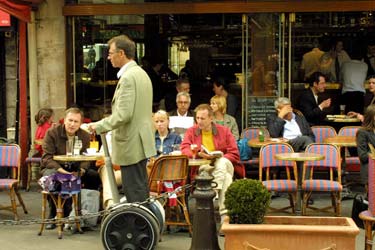 Our belated epiphany came courtesy of David Mebane, the owner of Mike's Bike Tours, which conducts bicycle tours of the city. (Yes, he knows it should be called David's Bike Tours; long story.) David, an easygoing 27-year-old Texan, led us around Paris for four hours on his Schwinn as we followed on our Segways, "Make Way for Ducklings"-style. Every once in a while he would stop, lean over the handlebars, and explain something: "Marie Antoinette's head was lopped off in the place there, totally decapitated by the guillotine"; "If you go over to the third window to the right of that arch of the Louvre, you can look in and see the Venus de Milo for free"; "Down there in the Hôtel des Invalides, my favorite building in Paris, so beautiful when it's all lit up at night, the French resistance built a false ceiling in the dome—just below that second level of windows. They hid U.S. airmen who'd been shot down, bomber crews and so on, between the two ceilings."
Our belated epiphany came courtesy of David Mebane, the owner of Mike's Bike Tours, which conducts bicycle tours of the city. (Yes, he knows it should be called David's Bike Tours; long story.) David, an easygoing 27-year-old Texan, led us around Paris for four hours on his Schwinn as we followed on our Segways, "Make Way for Ducklings"-style. Every once in a while he would stop, lean over the handlebars, and explain something: "Marie Antoinette's head was lopped off in the place there, totally decapitated by the guillotine"; "If you go over to the third window to the right of that arch of the Louvre, you can look in and see the Venus de Milo for free"; "Down there in the Hôtel des Invalides, my favorite building in Paris, so beautiful when it's all lit up at night, the French resistance built a false ceiling in the dome—just below that second level of windows. They hid U.S. airmen who'd been shot down, bomber crews and so on, between the two ceilings."
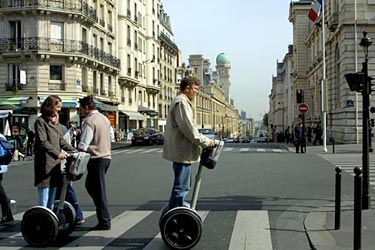 He had the patient manner of someone who must explain to American visitors, several times a day, why the ATMs here don't dispense dollars. While an implacable enemy of French bureaucracy, he loves the French and their history. At Place Clemenceau, he wheeled up beside a dark green statue of Charles de Gaulle and said, "Little World War II story. Obviously, de Gaulle was leading the Gaullist resistance, but there was also a Communist resistance, and when the Allies took Paris back there was a void of power—who's going to take over? August, 1944, de Gaulle flies in from London to take command but gets extremely low on fuel, it's a near thing, is he going to make it?" I guessed that he would. "He lands with nothing in the tank," David continued, "then walks down the Champs Elysées in a big parade with all the soldiers and citizens, from the Arc de Triomphe to Notre-Dame, with German snipers on rooftops taking potshots at him, whatever, craziness, but nobody hits him and he takes the keys to the city. There's just this tremendous celebration of liberation."
He had the patient manner of someone who must explain to American visitors, several times a day, why the ATMs here don't dispense dollars. While an implacable enemy of French bureaucracy, he loves the French and their history. At Place Clemenceau, he wheeled up beside a dark green statue of Charles de Gaulle and said, "Little World War II story. Obviously, de Gaulle was leading the Gaullist resistance, but there was also a Communist resistance, and when the Allies took Paris back there was a void of power—who's going to take over? August, 1944, de Gaulle flies in from London to take command but gets extremely low on fuel, it's a near thing, is he going to make it?" I guessed that he would. "He lands with nothing in the tank," David continued, "then walks down the Champs Elysées in a big parade with all the soldiers and citizens, from the Arc de Triomphe to Notre-Dame, with German snipers on rooftops taking potshots at him, whatever, craziness, but nobody hits him and he takes the keys to the city. There's just this tremendous celebration of liberation."
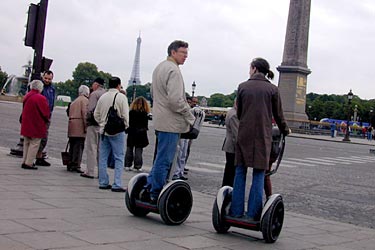 Amanda looked up at de Gaulle in his uniform and kepi. "He looks like he belongs in Singin' in the Rain," she said. The figure did look rather as if it were beginning to pirouette and break into song.
Amanda looked up at de Gaulle in his uniform and kepi. "He looks like he belongs in Singin' in the Rain," she said. The figure did look rather as if it were beginning to pirouette and break into song.
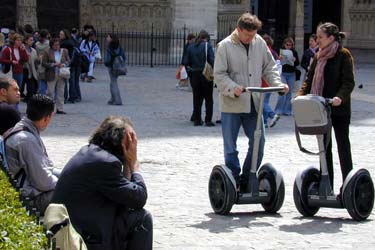 "Or like the Morton Salt girl," David said.
"Or like the Morton Salt girl," David said.
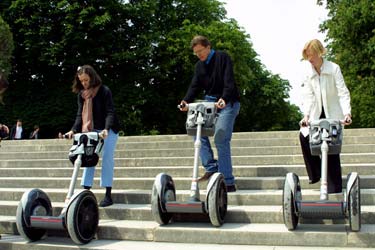 It was a sunny day at last, and all Paris seemed to be out and in a cheerful mood. It might well have just been coincidence, but cultural understanding of the Segway seemed to have seeped into the collective consciousness. On our first day here no one knew what the machine was, but today four different people seemed to know all about the Segway and its gyroscopes and began explaining it to other bystanders as we talked nearby.
It was a sunny day at last, and all Paris seemed to be out and in a cheerful mood. It might well have just been coincidence, but cultural understanding of the Segway seemed to have seeped into the collective consciousness. On our first day here no one knew what the machine was, but today four different people seemed to know all about the Segway and its gyroscopes and began explaining it to other bystanders as we talked nearby.
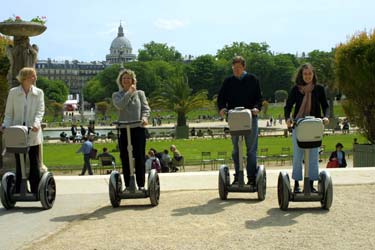 As we slalomed around I.M. Pei's glass pyramid in the Louvre's courtyard, a photographer who shoots Polaroid photos of tourists there at 6 euros a snap began asking rapid-fire questions. A short, intense man in a red windbreaker, he was curious about the Segway's range. When I said that it was 17 to 25 kilometers, he frowned and seemed to take against the whole idea. "But that's nothing," he said. "Paris is very large—what can you do with 20 kilometers? You can't get to the office and back!"
As we slalomed around I.M. Pei's glass pyramid in the Louvre's courtyard, a photographer who shoots Polaroid photos of tourists there at 6 euros a snap began asking rapid-fire questions. A short, intense man in a red windbreaker, he was curious about the Segway's range. When I said that it was 17 to 25 kilometers, he frowned and seemed to take against the whole idea. "But that's nothing," he said. "Paris is very large—what can you do with 20 kilometers? You can't get to the office and back!"
David took up the cudgels. After riding the Segway in the courtyard, he had decided that he wanted one for leading his tours. "You can always recharge. It takes no time." (Well, five or six hours.)
"Four hours of use before you need to recharge, it's nothing," the photographer said. "My cell phone has a five-hour charge! And whose boss will let them charge the machine at the office?"
"The Segway engineers are working on extending the battery life," David said, which is true, but he was winging it. "The newest technology, magnesium—" he looked at me.
"Cadmium," I said, not entirely sure if that was what you use for batteries or enemas.
"Cadmium," David repeated confidently. "All the problems will be solved. Now, if this machine were a little cheaper and had a larger range, would you be interested?"
The photographer lowered his sunglasses and looked at it again, up and down, then broke into a charming smile. "It is very interesting," he said. "Very."
After we wound through the crooked streets of the Marais and had some superb sandwiches at Lina's, just off the rue de Rivoli, I noticed that my battery indicator was getting low. Halfway up the Champs Elysées, it indicated that I had no reserve at all, and as we were entering the home stretch on rue de Bassano, the user interface screen begin flashing red: nothing in the tank! My Segway was slowing, creeping, humming just a little: Would I make it?
I guessed that I would. And indeed I coasted up to the front door of the hotel with nothing in the tank. There was no tremendous celebration of liberation, just a chance to get off and recharge and think happy thoughts about the imminent possibility of dinner. The French helped liberate us in 1776, we returned the favor later, and now both countries are free to be provoked and intrigued by each other and to disparage each other's wine.
Amanda had been following right behind me to give me a push if necessary. "Liberté, Egalité, Fraternité—and Segway," she said.
So my question: Are you being paid to support lies?
<a href=www.vheadline.com>Venezuela's Electronic News
Posted: Friday, May 16, 2003
By: Daniel Alejandro Rivas Casanova
Date: Fri, 16 May 2003 16:08:15 +0000
From: Daniel Alejandro Rivas Casanova geodaniel@hotmail.com
To: Editor@VHeadline.com
Subject: Get the true facts
Dear Editor: Reading your editorial statement: "We seek to shed light on nefarious practices and the corruption which for decades has strangled this South American nation's development and progress" ... it is obvious that you are not aware or you are, but other interests distract you from the fact that during Chavez government the oil barrel has reached historical prices (and not in the lower end!).
In other words, in any other Presidential 5-year term, more money has entered the Venezuelan fiscal system. So where is that money? Have you seen in Caracas lately? It is incredible how dirty the city has become, and how the commercial activity has decayed! Have you been in eastern Venezuela? (Puerto La Cruz, Maturin, Puerto Ordaz) those cities had slowed down their development rate in a way you would not believe! Not to talk about Maracaibo and Valencia.
So my question: Are you being paid to support lies? ...if this is the case, be aware that your are in complicity with a people that do not think twice before killing innocent people (Plaza Altamira), steal federal funds (FIDE, Plan Bolivar 2000, etc), support terrorism (Colombian guerrillas, please don't be naive!) and worst for you: they hate uncle Sam (just look the background of anyone in the goverment!).
So be a proud American (at least!) if you don't care much about Venezuela, and quit this bunch of lies!
Support Real Democracy and Freedom!
Best wishes,
Daniel Alejandro Rivas Casanova
geodaniel@hotmail.com
 Our belated epiphany came courtesy of David Mebane, the owner of Mike's Bike Tours, which conducts bicycle tours of the city. (Yes, he knows it should be called David's Bike Tours; long story.) David, an easygoing 27-year-old Texan, led us around Paris for four hours on his Schwinn as we followed on our Segways, "Make Way for Ducklings"-style. Every once in a while he would stop, lean over the handlebars, and explain something: "Marie Antoinette's head was lopped off in the place there, totally decapitated by the guillotine"; "If you go over to the third window to the right of that arch of the Louvre, you can look in and see the Venus de Milo for free"; "Down there in the Hôtel des Invalides, my favorite building in Paris, so beautiful when it's all lit up at night, the French resistance built a false ceiling in the dome—just below that second level of windows. They hid U.S. airmen who'd been shot down, bomber crews and so on, between the two ceilings."
Our belated epiphany came courtesy of David Mebane, the owner of Mike's Bike Tours, which conducts bicycle tours of the city. (Yes, he knows it should be called David's Bike Tours; long story.) David, an easygoing 27-year-old Texan, led us around Paris for four hours on his Schwinn as we followed on our Segways, "Make Way for Ducklings"-style. Every once in a while he would stop, lean over the handlebars, and explain something: "Marie Antoinette's head was lopped off in the place there, totally decapitated by the guillotine"; "If you go over to the third window to the right of that arch of the Louvre, you can look in and see the Venus de Milo for free"; "Down there in the Hôtel des Invalides, my favorite building in Paris, so beautiful when it's all lit up at night, the French resistance built a false ceiling in the dome—just below that second level of windows. They hid U.S. airmen who'd been shot down, bomber crews and so on, between the two ceilings."
 He had the patient manner of someone who must explain to American visitors, several times a day, why the ATMs here don't dispense dollars. While an implacable enemy of French bureaucracy, he loves the French and their history. At Place Clemenceau, he wheeled up beside a dark green statue of Charles de Gaulle and said, "Little World War II story. Obviously, de Gaulle was leading the Gaullist resistance, but there was also a Communist resistance, and when the Allies took Paris back there was a void of power—who's going to take over? August, 1944, de Gaulle flies in from London to take command but gets extremely low on fuel, it's a near thing, is he going to make it?" I guessed that he would. "He lands with nothing in the tank," David continued, "then walks down the Champs Elysées in a big parade with all the soldiers and citizens, from the Arc de Triomphe to Notre-Dame, with German snipers on rooftops taking potshots at him, whatever, craziness, but nobody hits him and he takes the keys to the city. There's just this tremendous celebration of liberation."
He had the patient manner of someone who must explain to American visitors, several times a day, why the ATMs here don't dispense dollars. While an implacable enemy of French bureaucracy, he loves the French and their history. At Place Clemenceau, he wheeled up beside a dark green statue of Charles de Gaulle and said, "Little World War II story. Obviously, de Gaulle was leading the Gaullist resistance, but there was also a Communist resistance, and when the Allies took Paris back there was a void of power—who's going to take over? August, 1944, de Gaulle flies in from London to take command but gets extremely low on fuel, it's a near thing, is he going to make it?" I guessed that he would. "He lands with nothing in the tank," David continued, "then walks down the Champs Elysées in a big parade with all the soldiers and citizens, from the Arc de Triomphe to Notre-Dame, with German snipers on rooftops taking potshots at him, whatever, craziness, but nobody hits him and he takes the keys to the city. There's just this tremendous celebration of liberation."
 Amanda looked up at de Gaulle in his uniform and kepi. "He looks like he belongs in Singin' in the Rain," she said. The figure did look rather as if it were beginning to pirouette and break into song.
Amanda looked up at de Gaulle in his uniform and kepi. "He looks like he belongs in Singin' in the Rain," she said. The figure did look rather as if it were beginning to pirouette and break into song.
 "Or like the Morton Salt girl," David said.
"Or like the Morton Salt girl," David said.
 It was a sunny day at last, and all Paris seemed to be out and in a cheerful mood. It might well have just been coincidence, but cultural understanding of the Segway seemed to have seeped into the collective consciousness. On our first day here no one knew what the machine was, but today four different people seemed to know all about the Segway and its gyroscopes and began explaining it to other bystanders as we talked nearby.
It was a sunny day at last, and all Paris seemed to be out and in a cheerful mood. It might well have just been coincidence, but cultural understanding of the Segway seemed to have seeped into the collective consciousness. On our first day here no one knew what the machine was, but today four different people seemed to know all about the Segway and its gyroscopes and began explaining it to other bystanders as we talked nearby.
 As we slalomed around I.M. Pei's glass pyramid in the Louvre's courtyard, a photographer who shoots Polaroid photos of tourists there at 6 euros a snap began asking rapid-fire questions. A short, intense man in a red windbreaker, he was curious about the Segway's range. When I said that it was 17 to 25 kilometers, he frowned and seemed to take against the whole idea. "But that's nothing," he said. "Paris is very large—what can you do with 20 kilometers? You can't get to the office and back!"
As we slalomed around I.M. Pei's glass pyramid in the Louvre's courtyard, a photographer who shoots Polaroid photos of tourists there at 6 euros a snap began asking rapid-fire questions. A short, intense man in a red windbreaker, he was curious about the Segway's range. When I said that it was 17 to 25 kilometers, he frowned and seemed to take against the whole idea. "But that's nothing," he said. "Paris is very large—what can you do with 20 kilometers? You can't get to the office and back!"